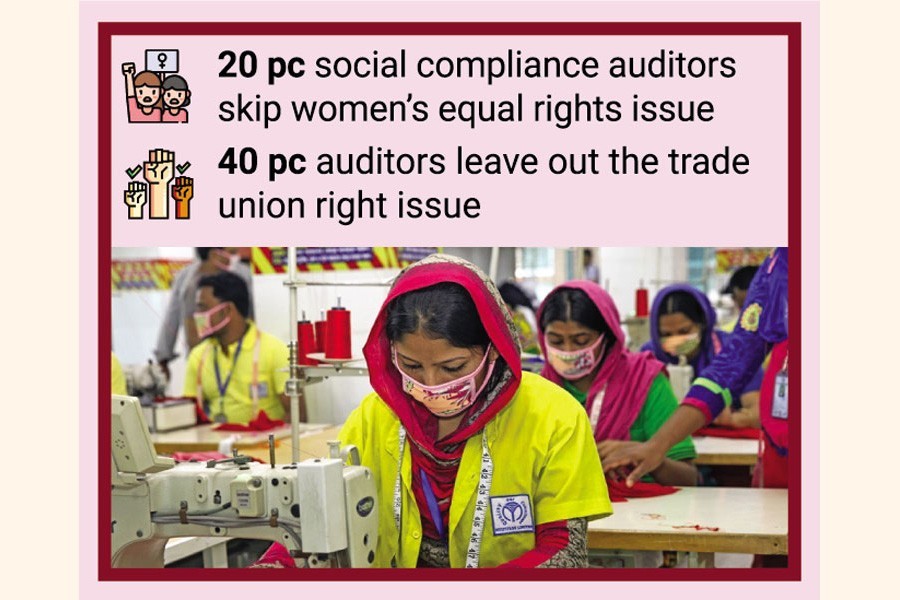
Published :
Updated :

The pandemic coronavirus has affected Bangladeshi women garment workers who bear the cost of Covid-hobbled disruptions to the billion-dollar sector, according to a latest international study.
It reveals that compliance audits done by companies were "largely ineffective", with around 20 per cent of social compliance auditors skipping women's equal rights issues in their audits and 40 per cent not auditing the right to trade union recognition.
It recommends reviewing and revising a legal framework of Bangladesh to protect worker rights and creating a UK fashion watchdog to tackle abusive purchasing practices by brands selling into the UK market.
Researchers at University of Aberdeen and trade justice charity Traidcraft Exchange UK published the report styled 'The impact of Covid-19 on women workers in the Bangladesh garment industry' on Wednesday.
The research highlighted experiences of workers in the apparel industry that supplies clothing and fashion products to multinational companies across the Global North, including many well-known UK High Street brands.
The immediate impact of Covid-19 and some of the actions taken by retailers like cancelling orders, refusal to pay for work in progress and demands for discounted prices disproportionately impacted women workers' vulnerability by contributing to an increase in gender violence, abuse and economic hardship.
The pandemic exacerbated interrelated vulnerabilities in economic, job, food and housing security, as well as health and wellbeing, with women workers struggling to support themselves and their families, it finds.
RMG is the mainstay of Bangladesh economy, accounting for 85 per cent of export earnings, about 20 per cent of GDP and directly employing about four million workers, with more than 12-million people totally dependent on the sector.
The in-depth research had face-to-face interviews with female and male workers, factory managers, industry leaders and trade unions between November 2020 and July 2021 as well as discussions with a number of development agencies and international advocacy NGOs.
According to the study, some employers refused to let workers return after lockdown.
"Most who did return said they had been forced to sign new contracts, losing access to benefits and protection they had previously accrued," it reads.
The report finds a rise in intimidation and threats, physical and sexual violence, and restricted movement while legal protection for women workers is limited as the grievance mechanisms in place.
Those which do exist are said to be often disregarded with impunity by many factory owners and managers.
On job loss, the study finds that "A quarter out of the 90 surveyed compliance auditors reported that employers had terminated workers, and one in 10 auditors didn't consider the issue part of their audit."
"The majority of workers… are women who are young, poorly educated and from rural areas with few alternative employment options," says project lead Muhammad Azizul Islam, professor in sustainability accounting and transparency at University of Aberdeen Business School.
"They are especially vulnerable to exploitation," he adds.
Although Bangladesh is signed up to global frameworks for promoting gender equality, including in employment, the research finds significant gaps in labour laws.
Even when international frameworks have been incorporated into domestic law, they are disregarded by many employers and rarely enforced, it alleged.
Fiona Gooch, senior private-sector policy advisor with Traidcraft Exchange UK, says: "UK fashion brands' purchasing practices are among the most abusive and least regulated in the world."
The study recommends the UK set up a fashion watchdog to stop abusive practices in their supply chains and protect workers in Bangladesh and other countries, including the UK.
They risk working in abusive and unsafe situations where conditions sometimes resemble slavery.
Bangladesh Garment Manufacturers and Exporters Association president Faruque Hassan said they faced issues like order cancellation, delayed payments and discounts during the first phase of Covid that forced many factories to shut and cut jobs.
"But after six months they (workers) are employed and now they are getting more benefits than the pre-Covid period, including enhanced wages," he claimed.
Regarding increase in harassment and violence, Mr Hassan told the FE that there might some cases during Covid period but the issue must not be generalised.
A good number of factories are yet to get their payments due to bankruptcy of some buyers, he noted.


 For all latest news, follow The Financial Express Google News channel.
For all latest news, follow The Financial Express Google News channel.